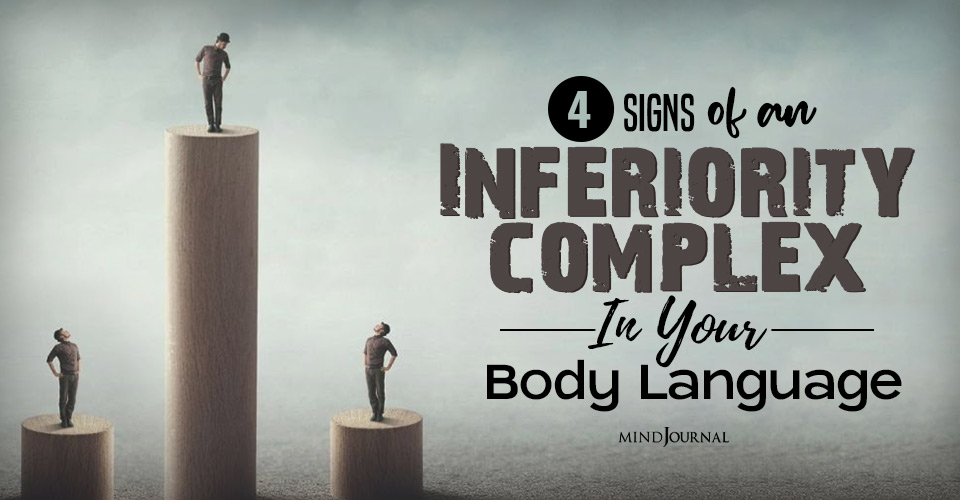We all might have been in situations where we felt as though we’re not as smart as our peers or we’re inferior. No matter how hard we try to hide feelings of inadequacy, our body language has a way of telling how we feel. This shows signs of inferiority complex.
No matter what we do, our body language has a way of giving ourselves away. Sure, words are a form of expression. However, body language and facial expressions are also important methods of communication. But before we get into the signs let’s learn more about what it is and how to know if you have an inferiority complex.
What Is An Inferiority Complex?
Inferiority complex relates to a personal feeling of inferiority, inadequacy, or weakness which may show up in situations where we feel lesser than our peers.
You don’t always need words to express yourself.
Your body language and facial expressions constantly communicate with those around you.
People who display a body language of inferiority complex have a significant impact socially. Even though we have never learned or studied how to understand body language, we still can interpret body language. This interpretation is, however, unconscious, but it determines how we see others and how we relate to them.
If you’re wondering what are the signs of inferiority complex, well the body language of an inferiority complex person showcases that they don’t love themselves. They tend to behave as though they have a “poor opinion of themselves”. In consequence, when people see or interpret how you see yourself, they usually tend to act accordingly. If you are not quite sure if you have an inferiority complex, here are some signs that might help you understand:
Related 7 Signs You Might Be Feeling Uncomfortable in Your Body Right Now
8 Signs of Inferiority Complex
- Having low self-esteem
- Being unable to reach your goals or feeling stuck
- Giving up easily
- Assuming the worst case scenario
- Constantly feeling the need to withdraw from social situations
- Often feeling down
- Experiencing anxiety and depression
- Being sensitive to criticism
However, experiencing these signs and symptoms doesn’t necessarily confirm that you have an inferiority complex. In such cases, you can seek professional help to understand whether you have an inferiority complex or not.

So in order to understand what your body language is giving away, here are a few common inferiority complex symptoms you may notice in yourself or someone who feels the same way.
Related: 21 Things That Change When You Start Respecting Yourself
4 common symptoms of an inferiority complex in your body language
1. Shrinking yourself
Animals make themselves small when they see danger or if they are at a disadvantage. They tend to shrink themselves in order to avoid being seen. Humans also have a similar tendency. But our version is different. It is more like retreating into our safe space or shells. This is a very common body language of someone with an inferiority complex.
It gets manifested by hunching over or the person’s back curves downward, in on itself. It typically occurs while sitting or walking.
2. Crossing the arms
People with inferiority complexes often cross their hands in order to create shields that isolate them from others or to protect their bodies. This body language is an expression of defensive attitude, self protection, and marking your territory. Crossing your hands in front of your chest implies that you are trying to protect yourself from someone or something that’s more powerful than you.
Related: 10 Toxic Habits That Lead To Poor Self-Esteem
3. Making small movements
The inferiority complex in you works its way when you feel like you should move quietly so that no one notices you. You think that you don’t want to bother anyone and so you make small movements to go unnoticed. Since people with inferiority complex think that they are inadequate, their first instinct is to assume that their presence makes other people feel uncomfortable. So you try to make sure that people know you because you feel ashamed when you are being acknowledged.
You tend to make small movements, take short steps, make limited hand gestures, and say small sentences. The goal or language of such behavior is to avoid being noticed.
4. Posture
The posture of someone while they sit, stand, walk or any other activity says a lot about their mindset. On the other hand, posture also influences how a person thinks or feels. The more you use the body language of the inferiority complex, the more you feel inferior.
When you feel insecure or if you lack confidence, you should try a different posture. A two-minute pose works like magic to change your negative thoughts that you have about yourself as mentioned in the book Presence: Bringing your Boldest Self to Your Biggest Challenges by psychologist, Amy Cuddy. She suggested that standing with your chest lifted, head held high, and arms either up or propped on your hips can help with your feelings of inferiority. It makes you feel empowered and strong.

How To Deal With An Inferiority Complex
If you want to overcome your feelings of inferiority, try the following steps:
- No one is perfect, we all have our own set of flaws and insecurities. So, start by practicing some self-acceptance.
- Learn to be value and be grateful for the things in your life. You will find yourself making fewer comparisons with others.
- To reduce your feelings of inferiority practice mindful meditation or any activity that brings joy.
- Try to give yourself a chance and achieve the things you thought you couldn’t do.
Related: 5 Mindful Steps To Help Overcome An Inferiority Complex
Final Thoughts
The feeling of inferiority doesn’t mean that there is something inherently wrong with you. You will have to become aware of your strengths and capabilities. Once you give yourself a chance and practice self-compassion, you’ll soon be to heal from this.
If you want to learn more about the signs of inferiority complex, below is a video you can watch:
Frequently Asked Questions (FAQs)
What is inferiority complex example?
A common example of inferiority complex is when you avoid putting yourself in social situations because you fear rejection and you may feel more comfortable fading into the background, rather than making conversations.
Is inferiority complex a mental illness?
Inferiority complex is not recognized as a mental health condition. However, it may lead to issues with self-esteem and confidence. Thereby affecting the mental health of a person,
What are the causes of inferiority complex?
An inferiority complex is frequently traced to negative childhood experiences of rejection or failure in adulthood.











Leave a Reply